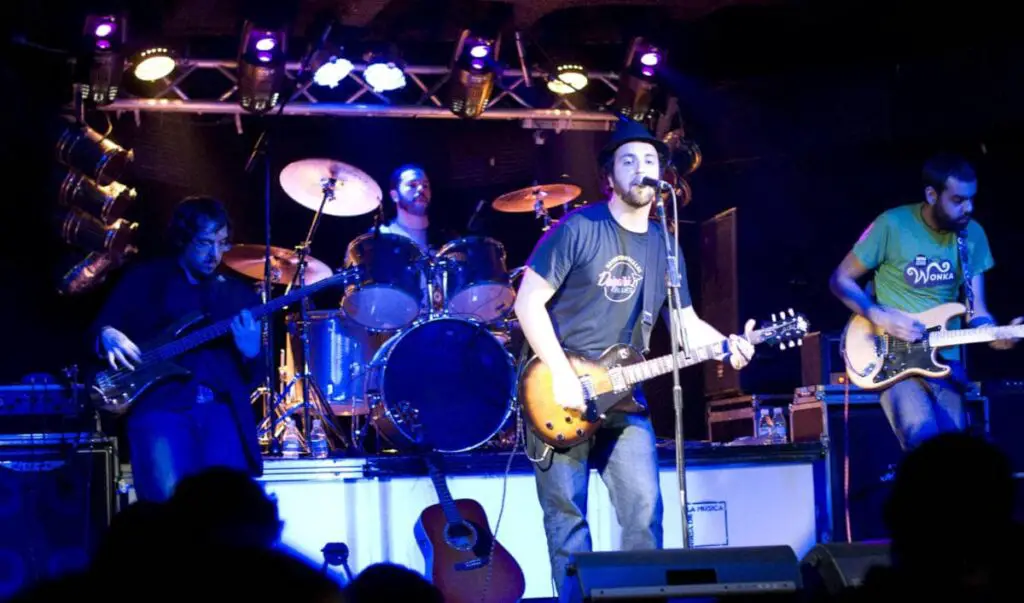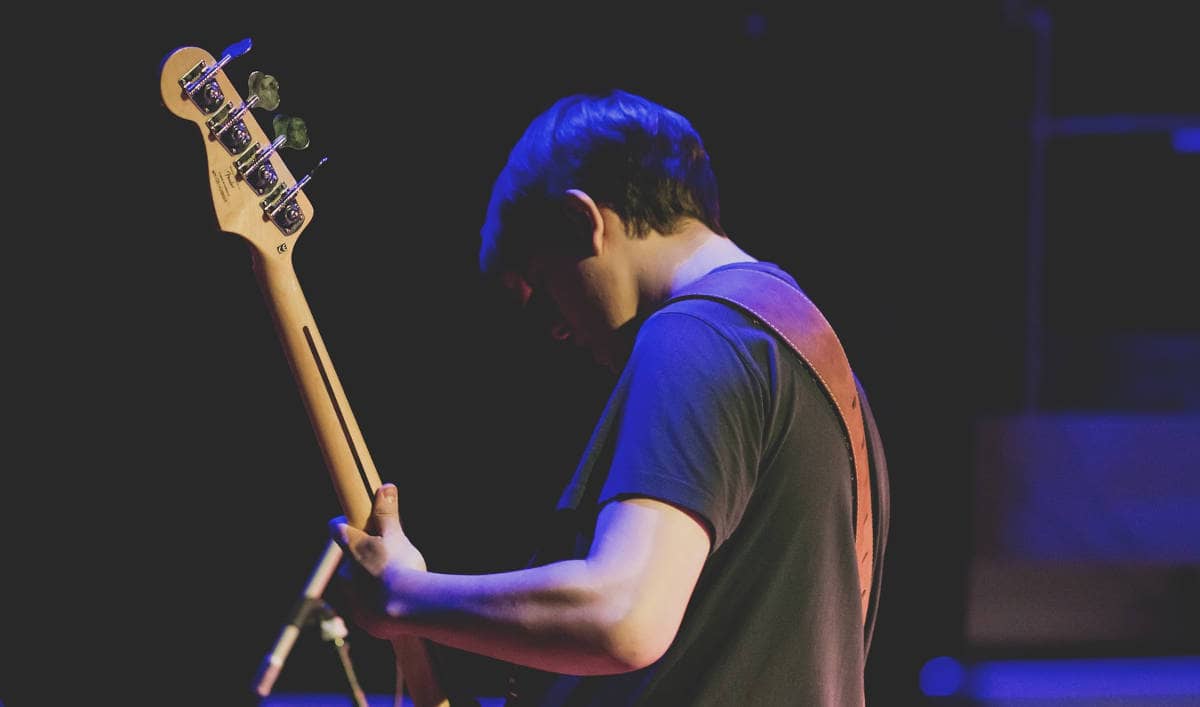Whenever I’ve talked to other musicians about overlooked instruments, the bass tends to be the first one to be brought up. This is because all bands seem to have a bassist, yet many listeners claim to not even hear the bass at all. This begs the question: Are bassists necessary?
The bass guitar fills the deeper frequencies in a band and ties the percussion together with the melodic instruments. A bassist is thus not a necessity, but without a bass player bands risk sounding thin and uncomposed.
While it is perfectly possible to play coherent music without a bassist, lacking one makes things significantly harder. In bands without a bass guitar, the role of the bassist is commonly filled by another member, such as the keyboard player.
So while having a bassist is not necessary, you’re about to see why not having one is generally a poor idea.
Do you really need a bass player?
A Bass player is not needed in order to have a functional band. While most bands prefer having a bassist, there are numerous bands who have filled the role of the bassist with different instruments or chosen to neglect it completely.
The bass guitar typically plays lower frequencies in the 40hz to 200hz range.
When a band lacks these frequencies it results in a sound that can feel hollow and lacking. This is especially noticeable in most modern music that is centered around explosive and impactful choruses. It’s difficult to attain the solid and full sound that we associate with modern choruses without these lower frequencies.
There are 4 ways that bands handle the need for lower frequencies:
- By having a bassist (Most common)
- By having another instrument fill the role of the bassist (Usually done by the keyboardist or guitar player)
- Tracking bass in the studio without having a bassist in the band (And using session musicians or backing tracks when playing live)
- Ignoring the issue of lacking the low frequencies and just rolling with it (Naturally, it is perfectly possible to write good songs even though you lack the low end.)
So no, you don`t need a bassist.
With that said, the bass is far from a useless instrument in a band. Having a bass player is the easiest and most common solution for covering the low frequencies in a band’s sound. Thus, most bands prefer having a bassist over not having one.

Is Bass the least important instrument?
Generally, people have different opinions about what the most important instrument in a band is. Very rarely though, do people answer the bass.
In fact, I have heard countless people say that they find the bass to be the least important instrument in a band. This also seems to be a common belief for musicians and music lovers alike.
However, research shows that the bass is the most important instrument in a band, and there are scientific explanations for this.
A 2014 study at the PNAS, concluded that the bass is the most important instrument in a band for several reasons. Here are the key points for why:
- It is easier to comprehend and feel the rhythm of a song when it is played in a lower register
- The bass dictates how we hear harmonies because our comprehension of chords is based on the lowest note we hear
- People at large respond more positively (tap feet, dance, etc) to songs that have a steady pulse and beat, which is provided by the bass guitar.
In short, the bass makes people feel and understand the music better than any other instrument.
Thus, the bass guitarplays an essential role in how we perceive music and fills an important role. To learn more about this subject, check out my article on why the bass is important in a band.
Bands without bass
Can a band have no bassist?
Absolutely.
Many successful bands don’t have a bassist. But what happens without a bassist, and what would songs sound like without bass?
In the table below you fill find bands without a bassist from different genres. For the most part, they have all found different solutions for the lack of low end that the lack of a bassist brings with it.
Some of these artists have also had some serious mainstream success, proving further that having a bassist is not a necessity in a band.
| Band | Genre | Lineup | Solution to not having bass |
| The White Stripes | Alternative Rock | Vocals, Guitar, Drums | Guitar pedals / None |
| The Doors | Rock | Vocals, Guitar, Keyboards, Drums | Keyboards |
| Yeah Yeah Yeahs | Indie Rock | Vocals, Keyboards/Guitars, Drums | None |
| Pig Destroyer* (1997-2014) | Grindcore | Vocals, Guitar, Drums | Tuned down guitar |
| Animals as Leaders | Progressive Metal | Two Guitars, Drums | Pitch Shifting |
| PS I Love You | Indie Rock | Vocals, Guitar, Drums | Bass Pedals |
| The Pack A.D | Garage Rock | Vocals, Guitar, Drums | None |
| The Evens | Indie Rock | Vocals, Guitar, Drums | Baritone Guitar |
| Sleater-Kinney | Punk | Vocals, Guitar, Drums | Guitar pedals / None |
| Local H | Grunge / Alt Rock | Vocals, Guitar, Drums | Backing track |
| Japandroids | Alternative Rock | Vocals, Guitar, Drums | None |
As you can see, bands without bassists have found many different ways to deal with the lack of a 4-sting.
These different solutions all have their pros and cons. The trade-off usually consists of losing the drive and groove a bassist offer, in favor of having a more manageable and unique-sounding band.

How to make music without a bassist
In general, musical acts want the deep frequencies in the 40hz to 200hz range to be filled by some instrument. When a band lacks a bassist, this role is typically filled by a keyboard, guitar, or brass player.
Here are the most common ways to fill the role of the bass guitar without having a bassist in your band:
Keyboards and Pianos – A typical piano has 88 keys, which means it has a range of more than 7 octaves. This means that it can be played in the same 40hz to 200hz range as the bass, and even lower if desired. Keyboard players can also recreate any type of instrument, meaning they can play bass parts using synthetic square or sawtooth sounds. They can also play bass parts using orgel or brass sounds, or even replicate a bass guitar played with fingers, thumb, or with a pick.
Guitars – Guitars players have to work harder than keyboard players to fill the role of a bassist because guitars are tuned an octave higher than basses. One solution to this is a 7-string guitar, which has an added low B string, which increases the guitar’s deep range. Both 6 and 7-string guitars can also be tuned down, giving them an even further deeper ranger. Another solution is playing a Baritone guitar, which also has a lower range. A simpler solution is to use an effect pedal to shift down the pitch of the guitar, which is an easy way to make it reach the deeper notes that we associate with the bass guitar.
Brass instruments – Tubas and Ophicleides tend to fill the role of the bass guitar in brass and jazz acts. These instruments have a slightly lower range than the bass guitar, with their lowest note being Bb1 to D1. While they fill the same frequencies, these brass instruments tend to play bass lines that are more common in jazz, rather than the type of basslines we find in rock, pop, and metal. Some acts in genres like Ska and Ska-Punk have had success using both deeper brass instruments and bass guitars in the same band.
MIDI and samples- In genres like EDM and Hip-hop, it is common to not use any recorded instruments on tracks. In these genres, the bass is often made using MIDI or sampled sounds. These sounds are generally used in the same way a keyboard player would fill the role of a bassist. Pop and hip-hop acts without live bands often rely on backing tracks that use MIDI or samples, rather than a live bassist or a pre-recorded bass track.
As you saw in the table above, some bands elect to just ignore the lack of low end altogether.
Neglecting the low end can at first glance seem like a lazy solution but in general, it’s not done due to laziness.
Successful bands that ignore the low end tend to have a lot of energy and rawness. While this makes the songs sound thinner, it also gives them a primal and expressive quality that can work really well in genres like rock and punk.
If you are fascinated by bands with 0 bassists, you might like this post about bands with 2 bassists.
What’s the point of a bass guitar?
As you saw above, there are many ways to fill the deeper frequencies in a band without a bassist. Yet, the bass guitar is a staple in most contemporary genres of music; so what is the point of a bass guitar, and why is it so common?
The point of the bass guitar is to create grooves and add drive to songs at deeper frequencies. While other instruments can reach these lower frequencies, the bass guitar can switch between notes and repeat individual notes faster in a clearer manner than other instruments at lower melodic ranges.
In other words, songs end up being less groovy and less punchy without a bass guitar.
The legendary Little Richard summed this idea up really well with the following quote:
Now they have banging guitar and no bass and call it rock, but that’s not what I call rock.
Little richard
If the bass is neglected in punchy genres, a lot of what made the genre great in the first place is lost.
Metal is a genre where some think of the bass as just the 3rd guitar. In one way, this is correct, as it is often playing a similar part to the rhythm guitar.
However, this doesn’t mean that the bass is redundant or that it doesn’t do a lot for the sound of the band as a whole.
For a great illustration of this point watch the video by MalephicBass below. Here he showcases some classic metal songs with and without the bass and adds a short explanation for what the bass is doing. This makes it easy to both feel and understand why the bass is important in these songs:
The bass is turned really loud in this example, but the video provides an important lesson in how hollow songs can sound without bass.

If it`s so important, why is bass guitar hard to hear?
If you watched the video above, you could notice how impactful the bass guitar is in metal music. Yet, there are several reasons why the bass is often hard to hear. So why is the bass so important if we can’t even hear it?
The Bass guitar is hard to hear due to playing in a deeper range and having multiple other instruments layered on top of it. Despite being hard to hear, the bass guitar still dictates how we perceive the rhythm and hear harmonies in songs.
So you are in fact hearing the bass guitar, but it can be difficult to make it out among the other instruments. Despite not being able to make out what the bass plays, it does impact how you hear the song as a whole, both rhythmically and harmonically.
If you find it difficult to notice, I`ve written a full guide on how to hear the bass better. Alternatively, here are two easy methods you can try:
Rhythmic exercise – A fun experiment to notice the bass guitar better is to EQ the bass up on a song where you struggle to hear it. With the bass turned up, you will not only be able to hear the bass line distinctly, but you might also feel like you’ve always known it.
Harmonic exercise – Another way to notice how the bass impacts a song as a whole, is to listen to some choral music. In choirs, the bass is more noticeable than in rock and pop, so you will notice how the entire choir is basing their harmonies around the deepest voice. By noticing how the bass works in a choir, the role of the bass guitar will make a lot more harmonic sense in a band setting as well.
Conclusion
Are bassists necessary? No, but songs sound hollow without a deep instrument. Most instruments can`t reach this deep range, and even fewer can navigate it as groovy as the bass guitar.
It is difficult to create a powerful and groovy sound without bass, Furthermore, research shows that the bassist is the most important member of a band. Thus, the bass guitar has become a staple in most modern genres and this is not looking to change any time soon.
Still, if you are looking to create a band and do not want a bass player, this is completely fine. Many musical acts have reached mainstream success without having a bass player, and have solved the issue of lacking low-end in various ways. Due to the bass guitar being common, this has also given these bands a more distinct and unique sound.
The impact of the bass guitar is most evident when listening to songs where the bass track has been removed. We instantly notice how the song has turned less powerful and less groovy. It will also feel hollow and harmonically lacking.
So in conclusion: Bassists are not necessary, but they fill an incredibly important role in a band and are a staple member of the modern band for a good reason.

